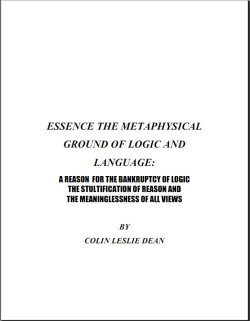
Nagarjuna the founder of Madhyamika examined the categories through which we understand the world via a reductio ad absurdum argumentation. His reductios showed that the all beliefs, or views about essences, individual identities, or essential natures reduce to absurdity. These reductios where to point to the sunyata [emptiness] of both the world and the absolute. The rejection of all views by the Prasangika Madhyamika Buddhists includes both the thesis and its antithesis. The crux of a Prasangika Madhyamika Buddhist analysis (prasanga) – a reductio ad absurdum argument – is that their demonstrations are non-affirming negations. They negate but don’t put forward any conclusion to such negation. This is because their negations are what they call non-affirming negations, they don’t affirm anything.
| Title | Essence the metaphysical ground of logic and language: a reason for the bankruptcy of logic, the stultification of reason and the meaninglessness of all views |
| Author | Dean, Colin Leslie |
| Published | Gamahucher Press, West Geelong, Vic, 2002 |
| Pages | 32 |
| Bibliography | 19-32 |
| Subject | Logic, Meaninglessness (Philosophy), Madhyamika (Buddhism) |
| ISBN | 1876347155, 1876347260 |
| Download |
![]()

